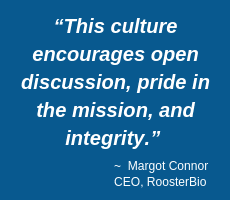
RoosterBio’s Got Plenty to Crow About
First in the ‘Plug and Play’ Stem Cell Products
RoosterBio has come a long way from its days in the FITCI incubator. In 2013, five people worked in a single small space. Now there is more than enough room for the current team of thirty-five, a common area, kitchen break room, large cubicles, and a lab. Both the lab and workspace have ample natural light – a nod to those with bench experience in often windowless environments, explains Jacob Pattasseril, VP of Operations.
 The layout does more than let in natural light. It makes it possible for members of the RoosterBio team to meet and work together in a variety of ways. “Our culture is very important to us,” says CEO Margot Connor. “This culture encourages open discussion, pride in the mission, and integrity.” Because the company culture is viewed as an important asset, it’s important to the team that the RoosterBio culture remain healthy and vibrant. People who are interested in a work environment based on this culture are drawn to the company.
The layout does more than let in natural light. It makes it possible for members of the RoosterBio team to meet and work together in a variety of ways. “Our culture is very important to us,” says CEO Margot Connor. “This culture encourages open discussion, pride in the mission, and integrity.” Because the company culture is viewed as an important asset, it’s important to the team that the RoosterBio culture remain healthy and vibrant. People who are interested in a work environment based on this culture are drawn to the company.
Jon Rowley, Ph.D., Founder and Chief Product Officer, first envisioned the market for ‘plug and play’ stem cells several years before the company’s founding, Connor explains. There was a bottleneck in the path to clinical trials. Any company moving toward human trials needed cells with requisite regulatory filings such as a U.S. FDA Master File (MF). Rowley theorized that the cells could be produced by a company that specialized in just that. This would make it unnecessary for companies working toward clinical trials to first develop stem cell products of their own. They could, instead, purchase cells with an MF from RoosterBio, referencing it in regulatory filings for their own therapeutics and saving years of development and millions of dollars as a result.
Today, RoosterBio is “developing standardized stem cell products that are ‘ready to use,’ or ‘plug and play,’” says Rowley. “That greatly simplifies the process of incorporating living cells into a new medical product that is being developed. We are working on making it 10 times easier and 10 times less expensive, truly democratizing stem cell technology.” As a result, stem cell products can now be viewed as components in the same way as are parts purchased when assembling a computer or rebuilding a car engine. Currently, RoosterBio is the only company in the United States selling clinical-grade stem cell banks for use in clinical trials.
RoosterBio’s cGMP stem cell products are manufactured in a cGMP pharmaceutical manufacturing facility under stringent production controls. The current challenge, says Rowley, is to scale production at a logarithmic rate. Ultimately, trillions of stem cells will be needed, either to meet the needs of one application or to meet the needs of many smaller applications. To scale up too quickly will put them ahead of the market; to scale up too slowly will put them behind the curve.
In its first five years, RoosterBio has experienced impressive success. Connor, who will speak at the HER Story Gala hosted by Women in Bio in three weeks, attributes this success to three things: their ‘plug and play’ business model, their company culture, and the paradigm shift that is currently occurring in health tech. By envisioning and creating a company that would commercialize ‘plug and play’ stem cell systems for product development in clinical trials, Rowley took the necessary steps to eliminate that bottleneck with a viable product that meets a significant unmet need. Just last week, RoosterBio announced it had submitted a U.S. Food and Drug Administration (FDA) Type II Master File (MF) for its CliniControl™ line of cGMP hMSC working cell banks. There’s plenty of reason to look forward to what the next five years will bring.





